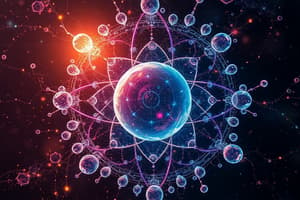Podcast
Questions and Answers
According to Thomson's experiments, what did he theorize about atoms?
According to Thomson's experiments, what did he theorize about atoms?
- Atoms are positively charged throughout.
- Atoms consist of positively charged electrons.
- Atoms contain negatively charged electrons. (correct)
- Atoms do not contain any particles.
In Rutherford's revised model of the atom, where is the majority of the atom's mass located?
In Rutherford's revised model of the atom, where is the majority of the atom's mass located?
- In the negatively charged electrons.
- In the positively charged nucleus. (correct)
- Evenly distributed throughout the atom.
- In the empty space around the nucleus.
What particle did James Chadwick discover in 1932?
What particle did James Chadwick discover in 1932?
- Electron
- Proton
- Neutron (correct)
- Positron
According to Niels Bohr's model, how do electrons move around the nucleus?
According to Niels Bohr's model, how do electrons move around the nucleus?
In the Quantum Mechanical Model, where are electrons placed?
In the Quantum Mechanical Model, where are electrons placed?
What did Rutherford's Gold Foil Experiment conclude about the structure of an atom?
What did Rutherford's Gold Foil Experiment conclude about the structure of an atom?
According to Democritus, what does the term 'atom' mean?
According to Democritus, what does the term 'atom' mean?
How did Aristotle describe all matter in terms of basic substances?
How did Aristotle describe all matter in terms of basic substances?
What did John Dalton propose about atoms of different elements?
What did John Dalton propose about atoms of different elements?
How did Democritus describe the motion of atoms?
How did Democritus describe the motion of atoms?
What was the significance of John Dalton's proposal regarding the creation and destruction of atoms?
What was the significance of John Dalton's proposal regarding the creation and destruction of atoms?
Which philosopher believed in the theory that all matter is made up of four basic substances with specific qualities?
Which philosopher believed in the theory that all matter is made up of four basic substances with specific qualities?




